|
|
|
Sort Order |
|
|
|
Items / Page
|
|
|
|
|
|
|
| Srl | Item |
| 1 |
ID:
137418
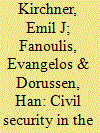

|
|
|
|
|
| Summary/Abstract |
Noting that European Union (EU) institutions are increasingly engaged in civil protection in the member states, security governance is used as an analytical framework to assess the depth of EU engagement in delivering civil security. It is shown that a state-centric approach is no longer adequate to understand the provision of civil security across Europe. To varying degrees, the EU has acquired responsibilities to facilitate, coordinate, manage, and regulate civil security, whether before or after a civil crisis occurs. The analysis demonstrates that, whilst intergovernmental practices and inter-state cooperation remain salient features of civil security, the responsibilities undertaken by the EU institutions across the entire policy spectrum are more substantial than a strictly intergovernmental perspective would suggest.
|
|
|
|
|
|
|
|
|
|
|
|
|
|
|
|
| 2 |
ID:
137403
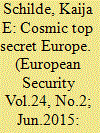

|
|
|
|
|
| Summary/Abstract |
As the EU has expanded its authority into areas of high politics such as monetary, defense, and foreign policy, it has simultaneously developed procedures for handling more sensitive and classified information. These critical policy domains require standards regulating secure information and personnel, but the concept of official secrets is in tension with the treaty norms of the EU. Observers allege that the classified information policy of the EU was imposed through the coercion of external actors such as North Atlantic Treaty Organization (NATO) and the USA in a significant historical departure from the information security policies of European member states. This article evaluates the content of EU-classified information policies and compares them to the content of European member states, NATO, and the USA, in an effort to clarify the mechanisms of policy diffusion in the area of information security.
|
|
|
|
|
|
|
|
|
|
|
|
|
|
|
|
| 3 |
ID:
137421
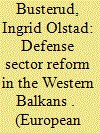

|
|
|
|
|
| Summary/Abstract |
This article analyses two different approaches to defense sector reform (DSR) in the Western Balkans. It explores the role of NATO in the reform process in Bosnia and Herzegovina (BiH), as well as Norway's involvement in Montenegro. Based on this, the article then compares and contrasts the two processes, and looks at the factors that have influenced their success or failure. The analysis show that both BiH and Montenegro have taken significant steps towards Euro-Atlantic integration, and that NATO and Norway have succeeded in part of their work to assist this effort. However, it also suggests that certain key factors for success in SSR have been less than optimal, such as donor coordination and the principle of local ownership. Both actors are also limited by the lack of a conceptual framework or guidelines for their work on DSR.
|
|
|
|
|
|
|
|
|
|
|
|
|
|
|
|
| 4 |
ID:
137420
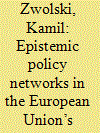

|
|
|
|
|
| Summary/Abstract |
This paper offers insights into an innovative and currently flagship approach of the European Union (EU) to the mitigation of chemical, biological, radiological, and nuclear (CBRN) risks. Building on its long-time experience in the CBRN field, the EU has incorporated methods familiar to the students of international security governance: it is establishing regional networks of experts and expertise. CBRN Centers of Excellence, as they are officially called, aim to contribute to the security and safety culture in different parts of Africa, the Middle East, South East Asia, and South East Europe, in the broadly construed CBRN area. These regional networks represent a modern form of security cooperation, which can be conceptualized as an epistemic policy networks approach. It offers flexibility to the participating states, which have different incentives to get involved. At the same, however, the paper identifies potential limitations and challenges of epistemic policy networks in this form.
|
|
|
|
|
|
|
|
|
|
|
|
|
|
|
|
| 5 |
ID:
137423
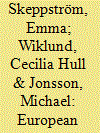

|
|
|
|
|
| Summary/Abstract |
With European Union Training Missions (EUTM) Mali and EUTM Somalia, the EU seeks to stabilize countries facing state weakness caused by intrastate conflict. While the EU formally promotes security sector reform (SSR) through its foreign policy, the EUTM missions in Mali and Somalia in one sense can be described as “counter-insurgency by proxy” as military trainees combat local insurgencies shortly upon graduation. This raises the question whether the EUTM missions are consistent with SSR aims, such as creating a security sector that is legitimate, sustainable, and under civilian control, or inadvertently risk contributing to negative side effects in the medium term. Based on extensive interviews in Belgium, Kenya, Mali, Sweden, and Uganda with personnel who either served in or planned these missions, this study analyses factors which hinder the EUTM concept from being fully consistent with SSR and identifies possible policies to ameliorate the risk of unintended side effects.
|
|
|
|
|
|
|
|
|
|
|
|
|
|
|
|
| 6 |
ID:
137416


|
|
|
|
|
| Summary/Abstract |
The financing of Common Security and Defence Policy (CSDP) operations questions the capacity of the European Union (EU) to contribute to crisis management. Instead of a single mechanism that would be used for all kinds of missions, different mechanisms are applied, depending on the objective and nature of the operation. The aim of this article is to explain change and inertia in the way these operations are funded. The first section is dedicated to the presentation of the legal framework and its characterization as a fragmented and flexible structure. It allows for identifying the changes that have affected the financing of EU operational activities abroad. The main problems and challenges in financing CSDP operations are dealt with in the second section. The third section explains: (1) why changes have occurred in some areas and (2) why inertia has prevailed in other areas in spite of the problems previously identified. Three main explanations are tested. Rules and practices in financing CSDP operations (1) result from operational needs, (2) are influenced by proactive supranational institutions and (3) are triggered by the Member States. These three explanations are not mutually exclusive. They all contribute to the understanding of CSDP operations, but the relative importance of each factor depends on the operations at hand. Generally, the second factor is at play in the case of civilian operations, while the third one prevails with regard to military operations. The first factor brings a complementary explanation to both kinds of operations.
|
|
|
|
|
|
|
|
|
|
|
|
|
|
|
|
| 7 |
ID:
137417


|
|
|
|
|
| Summary/Abstract |
The 2011 Libyan civil war prompted a reassessment of the normative foundation of the EU's conventional arms export control regime as armaments manufactured in Europe were used by Gaddafi's forces during the war. The EU's foreign policy identity is based, partly, upon a common approach to arms export involving respect for common criteria for export licences. Yet, prior to the civil war, considerable amounts of military equipment had been exported by member states to Libya, notwithstanding grounds for restraint on the basis of several of the criteria. This article traces member states' arms export to Libya during 2005–2010 to explore whether member states favoured restraint or export promotion. It concludes that although aware of the risks of exporting, in a competitive market for military goods, member states sought commercial advantage over restraint, and comprehensively violated export control principles. This casts doubts on assertions of the EU acting as a “normative power”.
|
|
|
|
|
|
|
|
|
|
|
|
|
|
|
|
| 8 |
ID:
137404
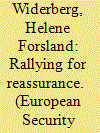

|
|
|
|
|
| Summary/Abstract |
This article examines how allies who shared the same overall goal chose different tactics. It compares how Norway, Poland, and Lithuania pursued a strengthened emphasis on collective defense in the revision of NATO's strategic concept, which was adopted in 2010. In their efforts on influence the outcome of this process, the three allies made use of both bilateral and multilateral channels, but differed in terms of rhetoric, political access, use of media, and mix of national and alliance interests. The article finds that not only size, but also different levels of alliance maturity and diplomatic skills can explain the different tactics. As the study demonstrates, these differences not only create internal dynamics in the form of learning and division of labor, but they can also affect decision-making.
|
|
|
|
|
|
|
|
|
|
|
|
|
|
|
|
| 9 |
ID:
137419
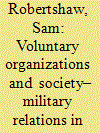

|
|
|
|
|
| Summary/Abstract |
The 2014 crisis in Ukraine has refocused attention on Russia as a European security actor. Despite showing renewed military capability, compared to the post-Soviet period, Russian society–military relations have remained the same. This relationship (between society and the security organs) provides the key context for assessing security. Analysis of everyday militarization and the role of voluntary organizations (such as DOSAAF [Dobrovol'noe obshchestvo sodeistviya armii, aviatsii i flotu] and Nashi [Molodezhnoe demokraticheskoe antifashistskoe dvizheni]) in supporting the military can provide an important insight into Russian behaviour as a security actor. These organizations generate a pro-military outlook and at the same time provide training and activities, thus contributing to military effectiveness by developing the competency of young people prior to military service as well as increasing public knowledge of military affairs. However, strong support for the military, a lack of independent information, and an absence of a shared vision on how society–military relations should be developed and also represent political challenges in terms of everyday militarization. This dynamic is important for understanding both Russia's security posture and wider security implications for Europe.
|
|
|
|
|
|
|
|
|
|
|
|
|
|
|
|
| 10 |
ID:
137409
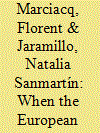

|
|
|
|
|
| Summary/Abstract |
Once only coordinating the foreign policy of its member states, the European Union (EU) now endeavors to speak on behalf of non-EU states. In the Organisation for Security and Cooperation in Europe (OSCE), its declarations are often backed by a large number of countries. This article enquires into the function of diplomatic alignment. Its findings question the use of alignment as a normative benchmark for European integration. It argues that adherence to EU norms is not the only rationale for alignment, and, more interestingly, that there are valid reasons not to align, which do not contradict EU norms, as well as more questionable reasons to align, which do. This article, in conclusion, argues that the function of alignment supports the EU's claim for international leadership, and that the reactions of non-EU states should be gaged in the light of this venture.
|
|
|
|
|
|
|
|
|
|
|
|
|
|
|
|
|
|
|
|
|